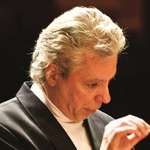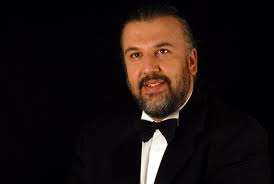|
Back
Homage To An 800-Year-Old Poet New York
Avery Fisher Hall, Lincoln Center
04/23/2012 -
Ahmet Adnan Saygun: Yunus Emre Oratorio, opus 26
Esin Talinli (Soprano), Ferda Yetiser (Mezzo soprano), Senol Talinli (Tenor), Tuncay Kurtoglu (Bass)
Jonathan Griffith Singers, Jonathan Griffith (Chorus conductor), TURKSOY Symphony Orchestra, Rengim Gökmen (conductor)

R. Gökmen (© Distinguished Concerts International-New York)
Amongst a plethora of sponsors for this rare performance of Turkey’s most esteemed oratorio were such distinguished Embassies as those of Azerbaijan, Kazakhstan and Turkey. So, with such eminent emissaries, why couldn’t they get the birthplace of the composer correct?
Ahmet Adnan Saygun was not born in Izmir, Turkey. His birth year being 1907, he was born in Smyrna, the Ottoman Republic. And for the records, he lived a very productive 83 years, embracing the Young Turks, the breakup of his Sultanate, two World Wars, and the coming of Paul Hindemith teaching in Ankara. Thus Mr. Saygun was more than adventitious in allying Turkish music with the west.
Mr. Saygun was also, if this oratorio is any example, a very proficient composer. Written in 1946, nothing is antiquated about the music. The large chorus, orchestra, and quartet of soloists sing for more than an hour, but none of it is boring. The music may have specks of Edwardian grandiosity, but the influences are more Slavic in nature.
One thinks of Bohuslav Martinů or early Bartók in a few passages. But as a whole, the Yunu Emre Oratorio owes an allegiance to a particular film music of Prokofiev. Not Nevsky, but the saturnine score to Ivan the Terrible. Mr. Saygun always skirts on the lugubrious in these slow choruses and solos, but underneath this is mystery and foreboding.

Y. Emre (© Traditional)
But this brings one to an important question. When I lived in Turkey for a year, the anecdotes and poetry of the Sufis and mystics, which usually included Yunus Emre, were joyful and optimistic. They might quote the Holy Koran, but the influence was certainly the Biblical Song of Songs. Nothing was doleful about Emre’s poetry. As a “perennial philosopher”, this 13th Century poet had the vigor of the Chassids and the burning joy of Christian saints. But this oratorio is remarkable for its mourning tone, its utter sadness.
Nor do the program notes help in this matter. First, no connection is given between the words and the soloists and choruses. When they become excited or lowdown, those knowing little Turkish were simply lost. I really wanted to know why sudden emotions would pop up and go away, for this work was not prayer, it was story.
Second, did the words for the oratorio come from the writing of Yunus Emre? Or were they an homage to the poet written by a 20th Century author? I certainly hope they weren’t from Emre. One tried to overlook the Antediluvian affected translation. (E.g. ”Hast thou exiled hither come? Why art thou mourning, nightingale?”) Yet even ignoring the syntax, nothing I remember of the Sufi poetry ever sounded so hopeless as the words last night.
If the meaning was lost, one could take pleasure in the excellent performance. The large TURKSOY Orchestra, none of whose personnel were listed, seemed to have mainly women in the string section, but I have no idea if this was a group of Turkish musicians or a pickup ensemble from New York. At any rate, the energetic and excellent conductor Rengim Gökmen allowed the strings, winds and, above all, those low growling brass to do their stuff. Nor did a more familiar name, Jonathan Griffith, fail with his large chorus. Composer Saygun had a Handelian invention in bringing soloists and chorus together, and their discipline was fine.

T. Kurtoglu (© Distinguished Concerts International-New York)
Of the four Turkish soloists, only one stood out, the bass–or should I say the basso profundo–Tuncay Kurtoglu. Like all the music of the Mongolian area, from Hokkaido through Tibet, Siberia and the Turkic peoples, baritones have little to do with serious music. The deeper the bass à la Boris Godunov, the greater the effect. Mr. Kurtoglu’s voice not only plumbed the depths, but it was rich, clear and powerful.
One might wonder what Yunus Emre would have thought of this oratorio. Doubtless he would have been appalled at all the sounds created for his own mystical joy. The music of Turkey is the silence of the Anatolian plains, over which Emre, the peripatetic preacher must have roamed. Mr. Saygun’s oratorio is a clever composition. But no way can its serious somber grandiloquence compare to the poetic dreams of its eight-century-old subject.
Harry Rolnick
|